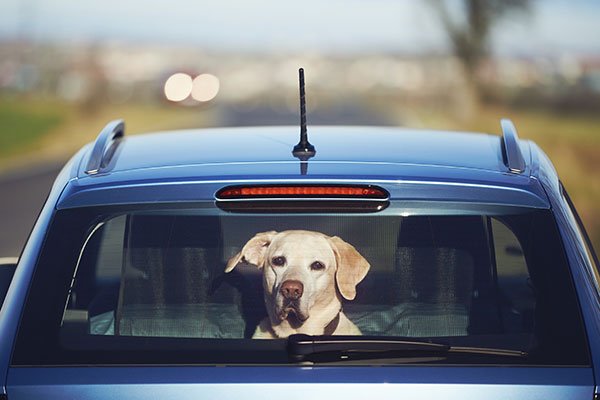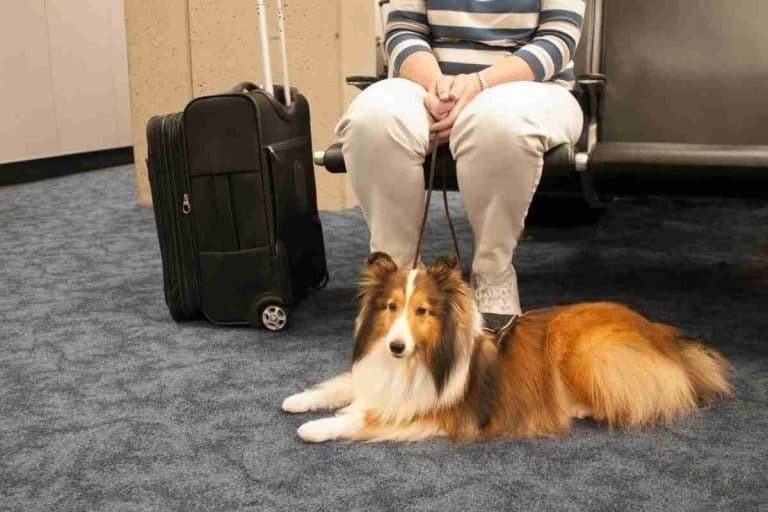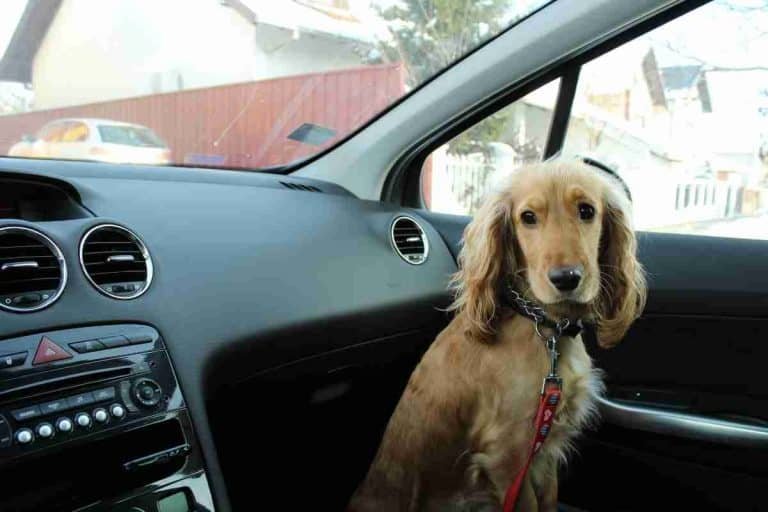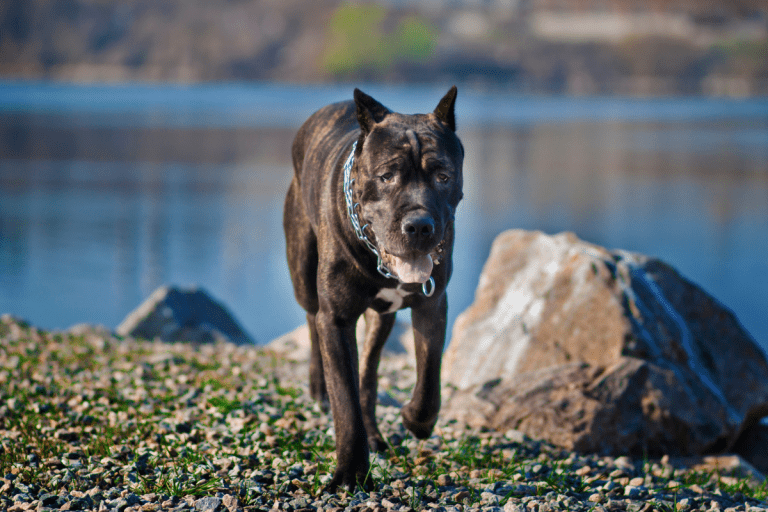No More Doggie Dramas: How to Make Car Rides Enjoyable for Your Motion Sick Pup!
Affiliate Disclaimer: As an affiliate, we may earn a small commission when you make a purchase from any of the links on this page at no additional cost to you!
Understanding Motion Sickness in Dogs
Motion sickness in dogs can be unpleasant for you and your pup. There are various possible causes such as motion-induced nausea, vertigo, anxiousness, or motion discomfort due to a pup’s size and body shape. In some cases, motion sickness may even be triggered by a dog’s recent meals or other digestive issues.
What are the Symptoms of Motion Sickness in Dogs?
There are some telltale signs that could help you identify motion sickness, such as trembling, drooling more than usual, barking, whining, hiding, licking their lips, yawning excessively, panting heavily, repetitive behaviors such as sniffing at the same spot and/or vomiting.

Are there any Breeds that are more Prone to Motion Sickness?
Unfortunately, motion sickness is something that affects many breeds of dogs but seems to occur in small to medium-sized dogs more often than large ones. Breeds like Pugs, Shih Tzus, Maltese, and Chihuahuas are especially prone to motion sickness due to their sensitive stomachs.
What is The Role of Anxiety in Motion Sickness in Dogs?
While motion sickness is primarily caused by motion, it can be exacerbated or even triggered by stress and overall feelings of unease. As a result, motion sickness can become worse if your pup is feeling anxious while travelling. It may be helpful to practice positive reinforcement and desensitization techniques beforehand if this is the case.
- Positive reinforcement: rewarding your pup for calming behaviors during travel, such as not whining or barking.
- Desensitization: getting your pup slowly used to travelling in a car like taking short trips around the block at first and eventually working up to longer trips.
Myths about Motion Sickness in Dogs
Myth #1: Dogs Outgrow Motion Sickness
Myth #2: Motion Sickness is Just a Minor Inconvenience
Myth #3: You Can’t Travel with a Dog Who Gets Motion Sickness
Myth #4: Medications are the Only Solution for Motion Sickness in Dogs
Myth #5: There is No Cure for Motion Sickness in Dogs
Steps to Take in Case of Motion Sickness Emergencies During Car Rides
Mild motion sickness can be managed with home remedies (see natural remedies below). If there are underlying conditions such as motion sensitivity or motion intolerance, your vet may be able to provide additional treatments.
Take regular rest breaks when travelling and create a safe environment for your pup by providing plenty of fresh air and comfortable areas within the car. If possible, park in well-lit areas away from crowds and traffic, to help your pup relax and feel more secure.
- Provide plenty of fresh air by opening the windows or using a fan to keep the air moving.
- Place comfortable cushions and blankets in the back seat so your pup can rest comfortably while travelling.
- Give your pup water frequently and provide snacks that will settle their stomach, such as plain cooked rice with some mashed banana.
If motion sickness persists even after trying these remedies, seek professional help from your vet.

How to Clean Up After Your Dog During a Car Ride
If your motion sick pup is prone to nausea, it’s important to be prepared. Clean up after your dog during a car ride, no matter how small the mess may be.
- Have a few rolls of paper towels and some disposable plastic bags on hand. Keep supplies in the back seat or within reach in the car. When motion sickness strikes, clean up any mess your pup may have made as quickly and efficiently as possible.
- It is best to use an enzymatic cleaner that neutralizes odors such as Nature’s Miracle or Simple Solution Dog Stain and Odor Remover. These cleaners can be sprayed directly onto the mess to help break down any bacteria that may cause odors.
- Once you’ve cleaned up the mess and disposed of the soiled paper towel and open a window or two to allow fresh air into the car. This will help clear away any lingering odors that could make your pup sick again.
- Don’t forget to give your motion sick pup lots of love and reassurance throughout the ride. This will help keep them as comfortable and relaxed as possible.
When to Seek Veterinary Care for Motion Sickness in Dogs
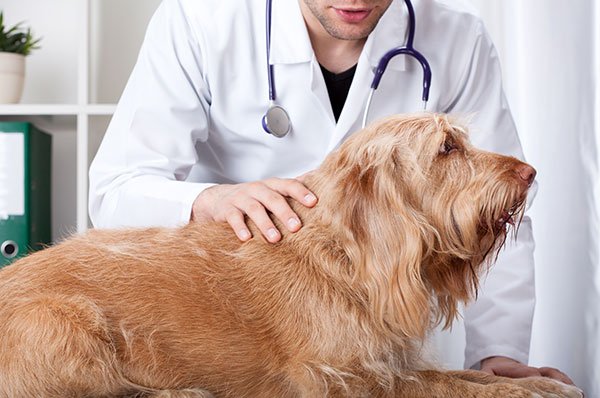
Motion sickness in dogs may be a sign of an underlying health issue, so if your dog seems particularly distressed or motion sick even when you are taking all steps to make the car ride enjoyable for them or if it is a recurring issue you may want to consider seeking veterinary care. Motion sickness in dogs can be treated with medication such as tablets or injections and in some cases, behavior modification might also help. Your veterinarian may also recommend motion sickness prevention aids such as specially designed travel harnesses or motion sickness Nomo Bands (available through Amazon).
Note: Some motion sickness may be caused by an inner ear infection or inflammation. It is important to rule out any potential medical issues before attempting motion sickness treatments or prevention aids.
The Role of Diet in Preventing Motion Sickness in Dogs

Foods to Avoid giving dogs Before Car Rides:
If your pup is motion sick, avoid giving your pup foods that contain a high fat content, such as cheese and processed meats as they are more likely to lead to an upset stomach during motion and make your pup very uncomfortable. Eating should be done at least two hours prior to taking off so that it has time to digest.
Foods to Give Your Dog Before Car Rides
The ideal pre-ride meal would be high in complex carbohydrates and low in protein. Some foods that are good for motion sick pups include oatmeal, rice, and boiled chicken. While on the road, try to limit snacks as these could make motion sickness worse. If you do decide to give your pup a snack, something dry like a piece of toast or a cracker would be best.
How to Transition Your Dog to a New Diet to Help with Motion Sickness
If your motion-sick pup is having digestive problems, it might be time to transition them to a different diet. Also, consider adding prebiotic and probiotic supplements to your pup’s diet as these can help keep their digestive tract healthy and may reduce motion sickness symptoms.
Take the time to slowly transition your pet onto this new food, as a sudden dietary change can cause stomach upset.
Steps to Take After a Motion Sickness Episode
If motion sickness has caused your pup to vomit during a car ride, it’s important for you to help them feel more comfortable. Here are some tips on how to do just that:
- Ensure that your dog is in the most comfortable position possible. This can be done by placing a blanket or pillow under them and reclining the car seat to a comfortable angle.
- Offer your motion sick pup some fresh water to sip on to settle their stomach and provide them with hydration after vomiting!
- Give your pup something calming and reassuring to focus on such as a favorite toy, a chew bone, or simply some gentle petting and ear scratches.
- Fresh air can help alleviate motion sickness symptoms. When possible, open the car windows to provide your pup with some fresh air while you’re driving.
Finally, make sure that you have motion sickness medication on hand for future car rides. This will help keep your pup feeling more comfortable and relaxed during travel, and may prevent motion sickness from occurring altogether!
When to Resume Car Rides After an Episode of Motion Sickness
It can be difficult to know when to resume the car trip after your pup has had an episode of motion sickness. Even if your pet seems to be feeling better, always make sure they have fully recovered before hitting the road again.
Medications and Remedies for Motion Sickness in Dogs
- Prescription Medications such as Cerenia and Dramamine for Motion Sickness can be supplied through a veterinarian.
- Over-the-Counter Medications such as Benadryl and Meclizine.
- Natural Remedies for Motion Sickness in Dogs include ginger, peppermint, CBD, chamomile, lavender, apple cider vinegar, coconut and slippery elm.
- Supplements such as CBD, melatonin and valerian root also help with Motion Sickness in dogs.

Conclusion:
Regardless of the cause, motion sickness can put a damper on your road trip with your pup. To make car rides more enjoyable for both you and your motion sick dog, it is important to be aware of all the potential causes of motion sickness in dogs. That way, you can take proper precautions before hitting the road. Making motion sickness a thing of the past can be hard, but with some patience and understanding, you can make car rides enjoyable again.
FAQ about Motion Sickness in Dogs
What is motion sickness in dogs?
Motion sickness in dogs is a common problem that can make car rides stressful and uncomfortable for both your pup and you. It’s caused by motion—such as the motion of a car, boat, or train—and usually results in nausea, drooling, panting, restlessness, and occasionally vomiting. Dogs with motion sickness will often be anxious and motion sick even before they get into the car.
How can I prevent motion sickness in my dog?
There are several tips and tricks you can use to help prevent motion sickness in your pup. Before you hit the road, make sure that your dog has eaten a light meal about two hours prior to traveling. This will reduce any motion-related stomach upset. Additionally, try to keep your pup’s head as close to the same level as the motion of the car. This will help with motion-sickness-related inner ear issues. Finally, keep your dog hydrated during the ride by providing him or her with water breaks throughout the trip. It’s also important to choose a type of motion sickness medication for your pup that is suitable for their size and breed. If motion sickness does occur in your dog, try to keep them as comfortable as possible. Provide a cool cloth to lay on, plenty of fresh air if possible, and let them rest
Can I give my dog medication for motion sickness?
Yes, motion sickness medications can be given to dogs, however, you should always consult your veterinarian before administering medication. Common motion sickness medications for dogs include Benadryl, Dramamine and Meclizine. These medications work best when administered prior to traveling. Additionally, it is important to note that they may cause drowsiness and you should not give your pup more medication than recommended by your vet. Natural remedies such as ginger, peppermint and CBD oil can also be used to help reduce motion sickness in dogs.
No matter what motion sickness remedy you decide to use for your pet, make sure that you have motion sickness medication on hand for future car rides.

